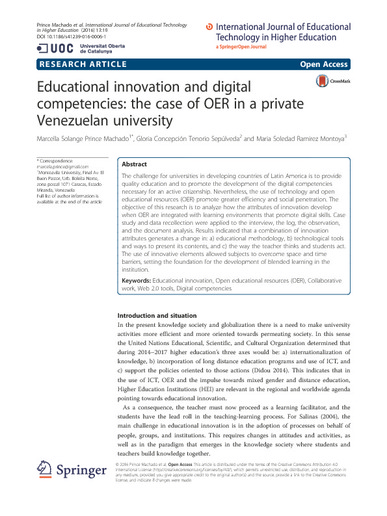| dc.contributor.author | Prince Machado, Marcella S. | en |
| dc.contributor.author | Tenorio Sepúlveda, Gloria C. | en |
| dc.contributor.author | Ramírez Montoya, María S. | en |
| dc.date.accessioned | 2016-04-01T21:18:42Z | en |
| dc.date.available | 2016-04-01T21:18:42Z | en |
| dc.date.issued | 2016-02-25 | en |
| dc.identifier.issn | 2365-9440 | en |
| dc.identifier.doi | http://dx.doi.org/10.1186/s41239-016-0006-1 | es |
| dc.identifier.other | International Journal of Educational Technology in Higher Education | es |
| dc.identifier.uri | http://hdl.handle.net/11285/604272 | en |
| dc.description.abstract | The challenge for universities in developing countries of Latin America is to provide quality education and to promote the development of the digital competencies necessary for an active citizenship. Nevertheless, the use of technology and open educational resources (OER) promote greater efficiency and social penetration. The objective of this research is to analyze how the attributes of innovation develop when OER are integrated with learning environments that promote digital skills. Case study and data recollection were applied to the interview, the log, the observation, and the document analysis. Results indicated that a combination of innovation attributes generates a change in: a) educational methodology, b) technological tools and ways to present its contents, and c) the way the teacher thinks and students act. The use of innovative elements allowed subjects to overcome space and time barriers, setting the foundation for the development of blended learning in the institution. | |
| dc.language.iso | eng | en |
| dc.publisher | SpringerOpen Journal | en |
| dc.relation.url | http://link.springer.com/article/10.1186/s41239-016-0006-1 | en |
| dc.rights.uri | http://creativecommons.org/licenses/by-nc-nd/4.0/ | * |
| dc.title | Educational innovation and digital competencies: the case of OER in a private Venezuelan university | en |
| dc.type | Artículo / Article | en |
| dc.identifier.journal | International Journal of Educational Technology in Higher Education | en |
| dc.subject.keyword | Educational innovation | en |
| dc.subject.keyword | Open educational resources | en |
| dc.subject.keyword | OER | en |
| dc.subject.keyword | Collaborative work | en |
| dc.subject.keyword | Web 2.0 tools | en |
| dc.subject.keyword | Digital competencies | en |
| dc.contributor.affiliation | Tecnologico de Monterrey | en |
| dc.subject.discipline | Ciencias Sociales / Social Sciences | |
| refterms.dateFOA | 2018-03-07T07:09:09Z | |
| html.description.abstract | The challenge for universities in developing countries of Latin America is to provide quality education and to promote the development of the digital competencies necessary for an active citizenship. Nevertheless, the use of technology and open educational resources (OER) promote greater efficiency and social penetration. The objective of this research is to analyze how the attributes of innovation develop when OER are integrated with learning environments that promote digital skills. Case study and data recollection were applied to the interview, the log, the observation, and the document analysis. Results indicated that a combination of innovation attributes generates a change in: a) educational methodology, b) technological tools and ways to present its contents, and c) the way the teacher thinks and students act. The use of innovative elements allowed subjects to overcome space and time barriers, setting the foundation for the development of blended learning in the institution. | |

